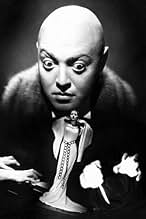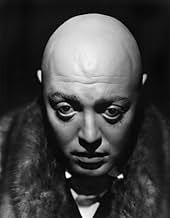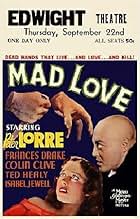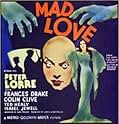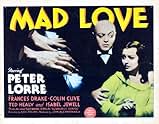IMDb RATING
7.2/10
6.2K
YOUR RATING
In Paris, a demented surgeon's obsession with a British actress leads him to secretly replace her concert-pianist husband's mangled hands with those of a guillotined murderer with a gift for... Read allIn Paris, a demented surgeon's obsession with a British actress leads him to secretly replace her concert-pianist husband's mangled hands with those of a guillotined murderer with a gift for knife-throwing.In Paris, a demented surgeon's obsession with a British actress leads him to secretly replace her concert-pianist husband's mangled hands with those of a guillotined murderer with a gift for knife-throwing.
- Awards
- 1 nomination total
Sara Haden
- Marie
- (as Sarah Haden)
George Davis
- Chauffeur
- (scenes deleted)
Billy Dooley
- Undetermined Role
- (scenes deleted)
Harold Huber
- Thief
- (scenes deleted)
Isabel Jewell
- Marianne
- (scenes deleted)
Leo White
- Undetermined Role
- (scenes deleted)
Sam Ash
- Detective Arresting Stephen
- (uncredited)
Hooper Atchley
- Train Conductor
- (uncredited)
Agostino Borgato
- Stage Doorman
- (uncredited)
Maurice Brierre
- Taxi Driver
- (uncredited)
Featured reviews
The legendary Karl Freund is definitely better known for his highly innovative work as director of photography, resulting in an extensive career (spanning across 5 decades) of beautiful and pioneering cinematography. With a body of work as impressive as his (ranging from Lang's "Metropolis" to TV's classic "I Love Lucy"), it is understandable that Freund's work as a director gets so easily forgotten. The fact that he only directed 10 films in his career also plays an important factor in this, however, at least 2 of his directorial efforts easily rank among the best horror movies ever made. The first one of the two (incidentally, his first work as a director in America), 1932's "The Mummy" is really the most popular, given that it is also one of the best performances by horror icon Boris Karloff; however, it is in the second one where Freund's talents really shine, making this last movie as a director his final masterpiece.
Loosely based on Maurice Renard's novel, "Les Mains d'Orlac" (literally, "The Hands of Orlac"), "Mad Love" is the story of Dr. Gogol (Peter Lorre), a brilliant surgeon deeply in love with a beautiful theater actress named Yvonne Orlac (Frances Drake). When season ends, Yvonne announces her retirement, and this prompts Gogol to finally meeting her. Unfortunately for Gogol, Yvonne tells him that she is actually married to concert pianist Stephen Orlac (Colin Clive). Saddened, Gogol leaves, but a bizarre turn of events will make him meet Yvonne one more time: Stephen has lost his hands in a terrible train accident and only Gogol's expertise will be able to save him. While he saves Stephen's hands, the operation begins to have serious side-effects, not only in Orlac, but also in Gogol.
While the screenplay was written by P.J. Wolfson, John L. Balderston and the usual assortment of contributing writers, the movie is mostly the work of Guy Endore and Florence Crewe-Jones, who made the adaptation from the French novel. Endore was a regular writer for MGM at the time, and helped to write other MGM's horrors like "Mark of the Vampire", "The Raven" and "The Devil-Doll"; it is his style, mix of Gothic and pulp novel what flows through the movie, although he remains true to the essence of Renard's classic horror novel. Renard is often credited as being the "inventor" of the Mad Scientist archetype, and truly gives a great use to it in his novel; appropriately, "Mad Love" keeps this psychological drama between characters and brings it to life, spending considerable time detailing the characters and their relationships, building up the necessary tension for the grandiose finale.
After directing several melodramas and comedies in a row, "Mad Love" allowed Freund to once again return to his expressionist roots and create a haunting tale of horror and madness in almost the same vein as his earlier classic, "The Mummy". Unlike what would be expected of a cinematographer, Freund dedicates as much attention to the non-visual aspects of the film as he does for the visual imagery, playing with the many different elements that form the bizarre love triangle of the film. The story itself focuses a lot in psychological themes, ranging from neurosis and hysteria, to compulsive obsession and dangerous psychosis; Freund makes great use of this themes across the movie, although it is obvious that he prefers the character of Dr. Gogol to the other protagonists of the film. Like Im-Ho-Tep the mummy, Dr. Gogol is driven by the mad love he feels for a woman, but unlike with the mummy, Freund makes sure to never fully transform Gogol into a monster, making him very human and frighteningly realist.
Peter Lorre's acting is essential for this last element in Gogol's persona, and he delivers one of this most amazing performances in his career. While lesser known than his characters in "M" or in "The Maltese Falcon", Dr. Gogol is certainly an iconic Lorre character that truly showcases Lorre's versatile talent. Frances Drake is surprisingly great, showing great emotion and excellent domain of the scene, giving her best to avoid being overshadowed by Lorre in their scenes together. Colin Clive, who would become famous as Dr. Victor Frankenstein in James Whale's films, delivers a truly effective performance as Orlac, but I found that Freund seems definitely much more interested in Dr. Gogol and his antics than in the pianist's neurosis, leaving few space to Orlac's growing insanity. Still, Clive does a very good performance despite the limited screen time his character receives when compared to Gogol.
It is probably this last point what truly stops this movie from being a classic of horror, as with a runtime of barely 68 minutes, it feels too short and gives the feeling that something was missing (perhaps a few more scenes with Colin Clive) in this psychological thriller. It's not really a big flaw in the end, but I truly was expecting to see the wonderful story being explored a bit more, as personally I felt it somewhat incomplete. On a different business, and as expected in a film by Karl Freund, the cinematography is simply brilliant, Chester A. Lyons and Freund's protegé, Gregg Toland (who would become a legend on his own), are in charge of it and devise one of the most beautifully looking horror of the 30s, easily on par with Freund's job for Universal.
It's a shame that studios were more interested in Freund's work as a cinematographer, because "Mad Love" proves that there he truly had talent as a director too. Who knows what would Freund had directed after this movie, specially considering the great improvements in cinematography he went on devising through his long and successful career. As it is, "Mad Love" is the final statement of a master who simply wasn't allowed to make more films (although who knows, probably he wasn't interested in directing), but it is nice to see him retiring with a top notch masterpiece. 9/10
Loosely based on Maurice Renard's novel, "Les Mains d'Orlac" (literally, "The Hands of Orlac"), "Mad Love" is the story of Dr. Gogol (Peter Lorre), a brilliant surgeon deeply in love with a beautiful theater actress named Yvonne Orlac (Frances Drake). When season ends, Yvonne announces her retirement, and this prompts Gogol to finally meeting her. Unfortunately for Gogol, Yvonne tells him that she is actually married to concert pianist Stephen Orlac (Colin Clive). Saddened, Gogol leaves, but a bizarre turn of events will make him meet Yvonne one more time: Stephen has lost his hands in a terrible train accident and only Gogol's expertise will be able to save him. While he saves Stephen's hands, the operation begins to have serious side-effects, not only in Orlac, but also in Gogol.
While the screenplay was written by P.J. Wolfson, John L. Balderston and the usual assortment of contributing writers, the movie is mostly the work of Guy Endore and Florence Crewe-Jones, who made the adaptation from the French novel. Endore was a regular writer for MGM at the time, and helped to write other MGM's horrors like "Mark of the Vampire", "The Raven" and "The Devil-Doll"; it is his style, mix of Gothic and pulp novel what flows through the movie, although he remains true to the essence of Renard's classic horror novel. Renard is often credited as being the "inventor" of the Mad Scientist archetype, and truly gives a great use to it in his novel; appropriately, "Mad Love" keeps this psychological drama between characters and brings it to life, spending considerable time detailing the characters and their relationships, building up the necessary tension for the grandiose finale.
After directing several melodramas and comedies in a row, "Mad Love" allowed Freund to once again return to his expressionist roots and create a haunting tale of horror and madness in almost the same vein as his earlier classic, "The Mummy". Unlike what would be expected of a cinematographer, Freund dedicates as much attention to the non-visual aspects of the film as he does for the visual imagery, playing with the many different elements that form the bizarre love triangle of the film. The story itself focuses a lot in psychological themes, ranging from neurosis and hysteria, to compulsive obsession and dangerous psychosis; Freund makes great use of this themes across the movie, although it is obvious that he prefers the character of Dr. Gogol to the other protagonists of the film. Like Im-Ho-Tep the mummy, Dr. Gogol is driven by the mad love he feels for a woman, but unlike with the mummy, Freund makes sure to never fully transform Gogol into a monster, making him very human and frighteningly realist.
Peter Lorre's acting is essential for this last element in Gogol's persona, and he delivers one of this most amazing performances in his career. While lesser known than his characters in "M" or in "The Maltese Falcon", Dr. Gogol is certainly an iconic Lorre character that truly showcases Lorre's versatile talent. Frances Drake is surprisingly great, showing great emotion and excellent domain of the scene, giving her best to avoid being overshadowed by Lorre in their scenes together. Colin Clive, who would become famous as Dr. Victor Frankenstein in James Whale's films, delivers a truly effective performance as Orlac, but I found that Freund seems definitely much more interested in Dr. Gogol and his antics than in the pianist's neurosis, leaving few space to Orlac's growing insanity. Still, Clive does a very good performance despite the limited screen time his character receives when compared to Gogol.
It is probably this last point what truly stops this movie from being a classic of horror, as with a runtime of barely 68 minutes, it feels too short and gives the feeling that something was missing (perhaps a few more scenes with Colin Clive) in this psychological thriller. It's not really a big flaw in the end, but I truly was expecting to see the wonderful story being explored a bit more, as personally I felt it somewhat incomplete. On a different business, and as expected in a film by Karl Freund, the cinematography is simply brilliant, Chester A. Lyons and Freund's protegé, Gregg Toland (who would become a legend on his own), are in charge of it and devise one of the most beautifully looking horror of the 30s, easily on par with Freund's job for Universal.
It's a shame that studios were more interested in Freund's work as a cinematographer, because "Mad Love" proves that there he truly had talent as a director too. Who knows what would Freund had directed after this movie, specially considering the great improvements in cinematography he went on devising through his long and successful career. As it is, "Mad Love" is the final statement of a master who simply wasn't allowed to make more films (although who knows, probably he wasn't interested in directing), but it is nice to see him retiring with a top notch masterpiece. 9/10
German actor Peter Lorre made his American film debut in "Mad Love," which I believe was an MGM release and proved to be competition for some of the popular Universal Horror films of the time. Peter Lorre had made his epic debut with 1930's "M," in which Peter amazingly played a child-killer under director Fritz Lang. Peter is a demonic performer if their ever was one, and every memorable scene in this film has Peter's lonely mad doctor character at the helm. Peter is very much in love with a stage actress who is preparing to marry a popular pianist, and all of this gets in the way of Peter's fantasy to have the woman all for himself. A train accident occurs, which leaves the pianist with little hope, but it is Peter the doctor who goes about replacing the pianist's hands with those of a dead criminal, whom Peter himself had watched the beheading of a few days before the train accident. Things take a very silly turn, when the hands somehow take over the very personality of the pianist, and Peter's mad doctor plays the innocent with the pianist, while at the time, telling his actress girlfriend that he is simply mad and that she should stay far and away from him. I would rather not mention how the story unfolds, because that would ruin the good fun for those who have yet to watch this feature, but I must admit that the ending is very funny in a sad way, and there's so much going on with Peter's sanity throughout the film. Worth seeing for a variety of different reasons, so watch it.
Brilliant surgeon Dr. Gogol is infatuated with Horror Theatre star Yvonne Orlac. After meeting her in person and realising that she only has eyes for her husband, the renowned pianist Stephen Orlac, he buys a life size mannequin of her and dreams of doing what Pygmalion did with Galatea. When Stephen is involved in an horrific train crash and has both his hands crushed beyond healing, Yvonne pleads with Gogol to help save his well being, he does, by amputating the crushed hands and grafting on the hands of a recently executed murderer, a murderer whose speciality was knives!
Mad Love is one of those amazingly old classics that is a hybrid of genre staples. At times it's surrealist and at others it's operating via a Grand Guginol pulse, whilst knowingly it laces the story with an uneasy comedic bent. Boasting camera work from Gregg Toland and Chester Lyons and directed by the impressive Karl Freund, this adaptation of Maurice Renard's novel is a chillingly memorable piece of work. Working off a plot that sees the bad Doctor driven by lustations rather than out and out insanity, Freund revels in slowly winding the coil until the spring that is Peter Lorre (Gogol) explodes (implodes), cloaking various scenes in telling shadows that themselves become integral to the plot. Peter Lorre is of course in his element, demented yet sympathetic, it's real hard to take your eyes away from his magnetic weirdness. Colin Clive as Stephen Orlac also puts in a performance of note, all twitchy nervousness and believable emotional torment, whilst Frances Drake more than adequately brings vulnerability to the centrifugal importance of Yvonne's emotional turmoil.
Weird and gorgeous, and incredibly well written, Mad Love holds up very well today as a horror/romance film of vast influential worth. So see it in the dark and marvel at its various moments of cinematic excellence. 8.5/10
Mad Love is one of those amazingly old classics that is a hybrid of genre staples. At times it's surrealist and at others it's operating via a Grand Guginol pulse, whilst knowingly it laces the story with an uneasy comedic bent. Boasting camera work from Gregg Toland and Chester Lyons and directed by the impressive Karl Freund, this adaptation of Maurice Renard's novel is a chillingly memorable piece of work. Working off a plot that sees the bad Doctor driven by lustations rather than out and out insanity, Freund revels in slowly winding the coil until the spring that is Peter Lorre (Gogol) explodes (implodes), cloaking various scenes in telling shadows that themselves become integral to the plot. Peter Lorre is of course in his element, demented yet sympathetic, it's real hard to take your eyes away from his magnetic weirdness. Colin Clive as Stephen Orlac also puts in a performance of note, all twitchy nervousness and believable emotional torment, whilst Frances Drake more than adequately brings vulnerability to the centrifugal importance of Yvonne's emotional turmoil.
Weird and gorgeous, and incredibly well written, Mad Love holds up very well today as a horror/romance film of vast influential worth. So see it in the dark and marvel at its various moments of cinematic excellence. 8.5/10
This adaptation of Renard's The Hands of Orlac is quite good, yet a bit on the stagy side. It is one of Peter Lorre's early films and his first for Hollywood. Lorre is quite good, and almost sympathetic in a way, as a surgeon who has hopelessly fallen in love with the wife of a great pianist. Colin Clive of Frankenstein fame plays the musician, and Frances Drake plays his rather annoying, overacting wife. The visuals of the film are first-rate, as it was directed by great cameraman Karl Freund. Ted Healy adds some unnecessary comic relief. What I liked best about the film was the staging of the story against some beautiful expressionistic sets and Freunds expressive camerawork.
I really enjoyed "Mad Love," it moves well and is a lot of fun to watch. It's certainly the most substantial role I've seen Colin Clive in other than his immortal portrayals of Dr. Frankenstein. Peter Lorre was such a great actor, he does scene after scene as the creepy Dr. Gogol with such natural ease, it doesn't seem like he's acting at all. Yet Dr. Gogol comes across as more pathetic than evil, which is crucial to this film, which has a very simple plot and a predictable ending.
Peter Lorre is great to watch! Even the most simple, corny line spoken by him rings with meaning and truthfulness, Lorre really knew how to play for/to the camera. This movie is only a little over an hour, highly recommended if you're going to do a double feature, and you're looking for a short feature as an appetizer.
Peter Lorre is great to watch! Even the most simple, corny line spoken by him rings with meaning and truthfulness, Lorre really knew how to play for/to the camera. This movie is only a little over an hour, highly recommended if you're going to do a double feature, and you're looking for a short feature as an appetizer.
Did you know
- TriviaCharles Chaplin called Lorre the screen's best actor after seeing his performance in "Mad Love."
- GoofsThroughout the picture, the wax figure moves slightly whenever Frances Drake is subbing for the actual statue. Most noticeable when the bird lands on her shoulder, making the "lifeless" statue sway.
- Quotes
Françoise, Gogol's Housekeeper: [referring to the wax figure of Yvonne] It went out for a little walk!
- Crazy creditsAt the end of the opening credits, the titles are painted on a glass window pane that is broken by a fist punching through it.
- Alternate versionsPhil Hardy's The Overlook Film Encyclopedia: Science Fiction (p. 94) states that there is an 85-minute version of the film, although he provides no details about this.
- ConnectionsEdited into The History of the Hands (2016)
- How long is Mad Love?Powered by Alexa
Details
- Release date
- Country of origin
- Language
- Also known as
- The Mad Doctor of Paris
- Filming locations
- Production company
- See more company credits at IMDbPro
Box office
- Budget
- $257,502 (estimated)
- Runtime1 hour 8 minutes
- Color
- Aspect ratio
- 1.37 : 1
Contribute to this page
Suggest an edit or add missing content




